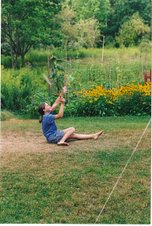I went looking for you after you exploded and left the house--
I started at the park where we would go when you were four--
The roses and their stray petals we’d bring home and put in a bowl--
the grass, all fenced off now--
-- in the gazebo, a Jewish wedding,-- in the heat,
people were holding up the canopy, everybody wore a yarmulke.
You weren’t in the gazebo of course, or lingering around the sand pit
now moved and painted blue.
A boy, wet from running in the sprinkler,
pulled at his shorts .
Of course you wouldn’t be here.
You had already finished revisiting this place,
and printing a photo essay of children playing,
capturing the pure attachments that form in an instant:
not knowing each other one minute,
then voila friendship!
You weren’t running on the loading platforms,
now stripped of their overhangs.
“The neighborhood’s gotten so fancy!” you noticed eight years ago
when you were eight and skipped up and down the steps of each platform, now all gone, none of that any more, just oversize housing for the rich and their children.
The weather promised rain but the heat just keeps steeping and the steam just keeps soaking us with sweat. If it were raining you wouldn’t ask me if we could
jump in the puddle on Harrison where the biggest pothole in New York City
used to make a splash basin. You are not there.
I walk down West Broadway and see the sign
--Paste Paper and Push for your business—
old and faded but not gone, a remnant of an age gone by.
Where are you my darling? My beautiful one?
Please come home and forgive me.

http://flickr.com/photos/indieink/573388546/














No comments:
Post a Comment
Please leave a comment